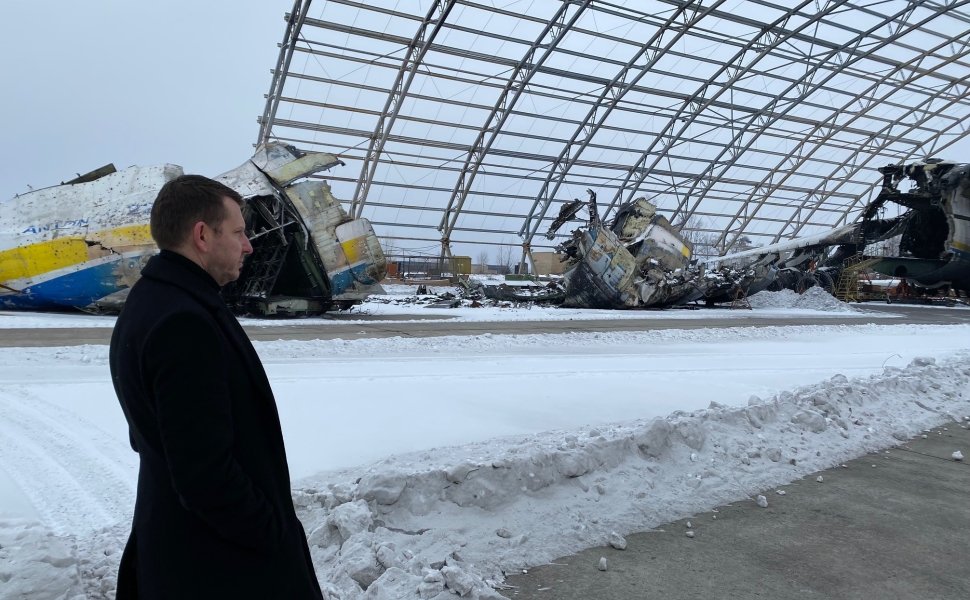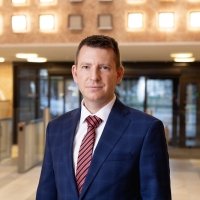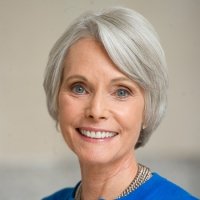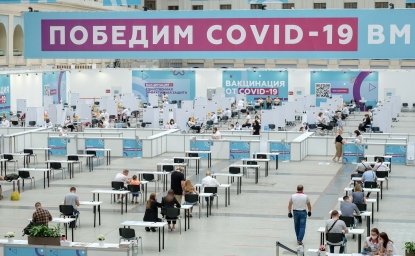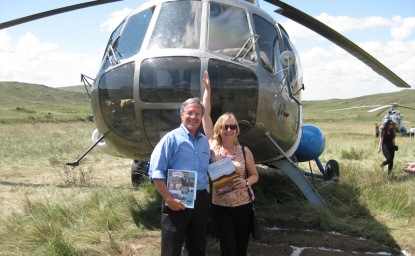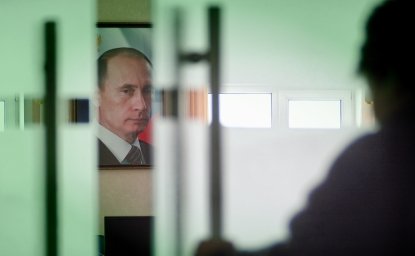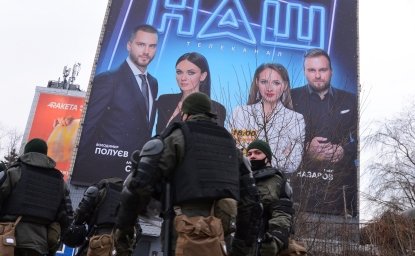Jill Dougherty: From the Kennan Institute in Washington DC., welcome to KennanX, a podcast on our never-ending quest to understand Russia, Ukraine and the surrounding region. I'm your host, Jill Dougherty.
***
Jill Dougherty: Well, good morning. What do I call you? Let's see, Jonatan Vseviov, do I call you Mr. Ambassador? Do I call you Secretary General? Do I call you Chancellor of Estonia's Ministry of Foreign Affairs? You have a lot of titles.
Jonatan Vseviov: Well, I have a few. You can call me Jonatan. That's perfectly okay. And it's quite late afternoon here, so good afternoon.
Jill Dougherty: Oh, same to you. It was actually a real pleasure to see you at the Lennart Meri Security Conference, which is where, I think it was the second time that I saw you. I saw you in Washington when you were the Ambassador a while ago, and now at Lennart Meri, which I try to get to every year, and it was a very interesting, for me, really interesting conference because, of course, the focus was on Ukraine and going back a little bit, into that time, let's say a year ago, even more, when the invasion took place. And you were saying essentially it wasn't a surprise. And I know the Americans were saying the same thing, because they released that intelligence that Russians were going to invade, but you had the deeper emotion when you said that. It was not a surprise. So, can you tell me about that?
Jonatan Vseviov: Sure. As I've said before, when we went to sleep on February 23rd of that year, we all knew that we would be waking up not because of an alarm clock, but because of a phone call from our situation center. That's how certain we were. It was to a large extent, because of the intelligence that was by then publicly disseminated, obviously privately between governments that had happened before. But also because of the years long focus we've had on Russia, it's foreign and security policy and the consistency and coherence with which the Putin government has pursued foreign policy goals. All of this made strategic sense to us, and when we started receiving the intelligence from our allies, we put that together with the intelligence that we ourselves had and put that together with the strategic picture that we knew we were headed towards war. And unfortunately, we were proven right.
Jill Dougherty: I was thinking as I was at the conference and it felt very actual being there, that here you have Estonia, nation of 1.3 million people right on the border with Russia, and it's been that way for many years, but how does a nation of that size survive? And now, I would say flourish right on that border. What is your political strategy, would you say?
Jonatan Vseviov: Well, not just for many years we've lived next to Russia for as long as there has been a Russia. So, it's a factor. It's nothing new, nothing surprising for us. So, we focus and we prepare. That's what we do. It doesn't surprise us. It doesn't shock us. It's nothing out of the ordinary. We've always had to deal with the neighbor that is a hundred times bigger than we are, and certainly since 1991, we've had a formula that has worked. We work hard to never be alone again. Comes directly from the lessons that we took from the 20th century when we did find ourselves to be alone after the, Molotov-Ribbentrop Pact when the Nazis and the Soviets became allies, and we found ourselves between two totalitarian regimes that had divided up Eastern Europe between themselves, there was no one to turn to.
So never be alone again, has always been pillar number one in our foreign and security policy. And secondly, not fighting is not the safer option. We learned that because of the same lessons in 1939-1940, when we were presented with an ultimatum by the Soviets, we decided to buy time to allow the Red Army into our country and postpone fighting a war for as long as we possibly could. What happened was that we had to fight the war in foreign uniforms with unspeakable crimes committed against us and others in our soil, and us losing 50 years of our history. So, since 1991, we've been focused on two things, never alone again, and preparing to make sure that we communicate clearly that we will not go quietly again.
That has helped us to be above 2% of the GDP defense spending wise, that policy took us to NATO and the European Union, but also every other institution there is. We have become the most integrated nation. In our region, we're a member of everything. The OSCE, the OECD, the Eurozone, the Schengen Area Free Movement. You name it we're a part of it. Not only because of economic interests or narrow interests that relate to these particular organizations, but also because of a strategic understanding that we need to make sure that as a country of 1.3 million, we never find ourselves in a position we found ourselves in back in 1940.
We've also worked hard to contribute to building a Europe that would be fundamentally different from the Europe of the past. A Europe that is united in the European Union and in NATO with the Americans and other transatlantic allies, part of the security construct here in the European continent. We work hard to strengthen those two organizations, both as institutions, as political bodies, but also with regard to their presence in the Baltic region, their presence in Estonia. We've brought allies here. We try to bring as much international activity to Estonia political, economic, and military. All of it informed by the same consideration, never alone again.
Jill Dougherty: Hmm. And now you have really Europe transformed. I mean, you have obviously a war taking place on the soil of Europe. You have NATO expanding, with Finland and probably Sweden. You have Germany changed. Almost every nation really has been changed by this. So how do you assess, and I know this is a broad question, but if you're to look at the map right now, what is this change that we're seeing? It obviously looks like it will be for a very long time, but how do you describe that?
Jonatan Vseviov: Well, pivotal events lead to significant international change. And the aggression that Russia unleashed on February 24th of last year put us all into a position where we know that everything will change. We're already seeing the changes. You mentioned some of them Finland's NATO membership and hopefully Sweden's NATO membership is one hugely positive development from our perspective, from NATO's perspective, but also from the perspective of stability and security in Europe. The European Union has changed. We have talked about our desire to be a strategic player, in not only in economic sphere, but also in the political sphere. And I think only now are we seeing, because of this war and during this war, we're seeing the European Union Act in truly strategic ways. This is not to argue that we're perfect. We're obviously not, there are a number of things where we need to and will, improve as a strategic actor, but we certainly have found ourselves as the European Union in the foreign policy domain. So, a lot of things have already changed, but we're not through those changes yet. Everything will depend on the outcome of the war, and not only will then Ukraine change, and Ukraine is a major country in Europe. Not only will Russia change depending on how this war ends, the European Union and NATO will change. And the most basic of norms upon which we've built the security system in Europe, they too will change.
So I think we're gonna live in a different Europe and in a different world from the one we inhabited on February 23rd of last year. That's why we're so focused on this war. It's not the geographic proximity that makes the war in Ukraine so important to us. It is because, perhaps because of the small size of the country, we are more immediately exposed to major strategic changes like the ones we're about to witness. And it is in our core national security interests to ensure that at the end of this war, we establish as the base or reestablish rather as the basic norms of international life in Europe. Those core principles that revolve around territorial integrity and sovereignty. This notion that aggression is illegal and unacceptable and discredited as a tool of statecraft. All of these things are extremely practical and have a direct impact on security for us as well as stability in all of Europe. So yes, things are changing, but the only thing that matters at the end of the day is the way this war ends.
Jill Dougherty: Hmm. And speaking of Estonia itself, I know you have a lot of refugees coming from Ukraine. I think the figure that I saw, 3% of your population now is Ukrainian. Is that correct?
Jonatan Vseviov: It is actually slightly above that. But yes, in general, we have received a very significant number of refugees from Ukraine.
Jill Dougherty: So, just focusing on Estonia for a second here, what would you say are the biggest direct influences on your country because of the war?
Jonatan Vseviov: Well, you mentioned the people and it's obviously that we're feeling the economic effects of the war, as is much of the world. We're feeling, it's perhaps more indirect, but because of the war, our people have recognized the necessity of investing more towards our defense. As I said, we were already significantly above the NATO agreed 2% benchmark. We're now solidly about 3%. See, quite a significant jump in the context of the economic situation we're in. We're working on security and foreign policy. I mean, it's normal for people like myself, my colleagues here in the Minister of Foreign Affairs, or the Ministry of Defense, or the Armed Forces to focus on security on a daily basis. That's why we've been hired. But it's the parliament, the government, the media, the civil society, writ large that has been thinking about. And discussing foreign and security policy since before February 24th. Actually, almost on a daily basis. It's on most days, front page news and top items on the nightly news shows, so that's been the effect.
I sometimes hear of people tiring. I do not sense that here in Estonia, not to the slightest. And I didn't sense that in Ukraine when I was there last, or when I was there before, during the war. I don't sense it. I think people here obviously feel the difficulty, but we also understand what is at stake and no matter how difficult it may be today, we also understand because of the proximity to our past. We understand the importance of what is at stake, and we understand perfectly well that if we allow it to become the norm that a larger state can violate its smaller neighbors’ borders, can dictate through the use of arms to its smaller neighbor, what kind of foreign and security policy it can have. If a larger state can decide whether its smaller neighbor gets to exist, not only as a state, but as a nation. If those things become the de facto norms of international life, then we're in for a rough ride. And not just us here on the periphery of Europe, but I suspect all of us. So, the fact that we are focusing as much as we are on this war is the biggest change, the biggest effect.
Jill Dougherty: And if you look, let's change the focus just a little bit to Russia, the aggressor with those principles that you're talking about. They believe that Ukraine is not a country. They believe that they can simply take it over and the other violations that you've talked about. So, if we look at Russia itself, I'm presuming that you would argue. At least under Putin, it always has been that way, or is that what you're saying? And how would you assess right now the stability of the Putin regime?
Jonatan Vseviov: Well, yes, the foreign and security policy that Moscow has pursued has been strikingly consistent with what they have said and with what they have done before. So strategically, very predictable. Very predictable. And they haven't hidden any of this. Given speeches on this, they've written public strategies, they've conducted their policy with no shame whatsoever, and yet until February 24th of last year, some masks still remained. It was still possible for people to argue in Western think tanks or in the press that perhaps what we're seeing is a combination or a series of misunderstandings, tactical disagreements, somewhere far, far away. On February 24th, the masks fell. It became strikingly clear that the Russian government is indeed willing to conduct large scale military aggression in the interest of pursuing these goals that they've always had, establishing a zone of frivolous interests on its borders, destroying the European security order as we know it, and subjugating Ukraine to Moscow.
What they've attempted to do until now, they've failed to achieve. The expectation was that Kyiv would collapse after a few days of fighting. That didn't happen. The expectation was that the west would be unable to unite and if able to unite, then unable to act in any meaningful way. We've proven them wrong, but it's too early for us to rest on the laurels. The war is still ongoing. And we have to stay focused on convincing the Russian leadership that what they have started, they have no chance of successfully ending from their perspective, convincing them that the cost of stopping this is lower than the cost of continuing aggression.
It's difficult to assess what exactly takes place within an increasingly authoritarian government's structures. We do assume or assess though, that tension inside Russia is rising and hopefully, hopefully we manage to convince them that for their own sake, they need to end this and pull out of Ukraine. Hopefully, we're able to convince them rather sooner than later. And for that we need to stay the course. We need absolute unity, and we need absolute clarity in the messages that we send. And here, by the way, I should also point out it's not just the words that are used that matter, it's also the action, the activities that we undertake. And in this regard, I'm very happy that recent decisions from key Western countries have communicated that we're in this for as long as it takes. The European Union's decision, for instance, to assist Ukraine with ammunition was noteworthy because of the amount of ammunition that we will provide, but also noteworthy in terms of the timing we've promised to allocate the assistance over a period of 12 months communicating that we are not changing course, next week, next month, in two months’ time, we're in this to win this.
Jill Dougherty: So going forward then, I mean, if we have this really radically changed situation, I presume obviously Estonia doesn't change its policy, but what would be your recommendation to your allies and other countries even in the global south? How should they look at Russia now? What is Russia? There used to be containment in the Cold War. Now there is this really, I think you'd have to say enmity, and certainly on the Russian part too. Russia looks at NATO as an enemy, looks at the United States as a country that wants to invade Russia, etc. So how does the world now look at Russia and evaluate going forward, how it deals with our country?
Jonatan Vseviov: I think our primary goal should be to get Russia back into Russia. I think that's an ambitious goal in of itself. I wouldn't go a step further before we achieve that goal, and once we achieve that goal, then a lot will depend on what Russia itself wants out of its relationship with us, with Europe, with the transatlantic community, with the international community in general, if they want a constructive relationship with us and it's not at all certain that they do. If they do, then we need to recognize that trust has been lost in fundamental ways. And for any kind of a constructive relationship, we need to start reestablishing trust. The Russians need to start reestablishing trust. That will take a long time. That will have to come in small gradual steps. It will have to include accountability for the crimes committed, the war crimes that are systematically being committed in Ukraine right now, but also the crime of aggression. It will have to include assistance in rebuilding what has been destroyed in Ukraine, and then very slow, gradual steps. But that all depends on whether Moscow wants to have a constructive relationship with us or not. If I could advise Russia, then I would advise them to want that sort of a relationship because we have now proven beyond any doubt that we in Europe can survive perfectly well without having a relationship with Russia. I'm not sure the same is true, vice versa. There was a lot of talk in the past on how dependent we were on Russia with regard to, for instance, energy resources. Well, we survived this winter. We're going to survive every winter to come. I'm not sure Russia can say the same for itself, but yes, small steps, small steps. But goal number one and a pre-condition for everything else, is to get Russia back into Russia.
Jill Dougherty: Well said. Thank you very much. This was a very interesting conversation. Jonatan Vseviov, the Secretary General of the Ministry of Foreign Affairs of Estonia. And I appreciate the depth of what you said. I mean, again, I come back from Estonia, we went out, to the military base where they had the NATO forces practicing for what is now quite a major military exercise. And I was really, I guess it was very, to use a Russian word, aktualna, it was very actual and real for me to see that and understand some of the stakes. So, thank you very much for talking with us. I really appreciate it.
Jonatan Vseviov: Thank you, and let me just say that for all those interested in European security, come to Estonia, see it for yourself. We actually do exist. We actually do take security seriously and we actually do live right next to Russia. And you get a totally different perspective when looking at the world from the location that we call home.
Jill Dougherty: That is true. I second the motion. Thank you very much. Thank you very much.
Jonatan Vseviov: Thank you, Jill.
***
KennanX is a product of the Kennan Institute at the Woodrow Wilson International Center for Scholars in Washington, DC. It is the Wilson Center’s oldest program, founded in 1974 by George F. Kennan, American statesman, James Billington, historian and former Librarian of Congress, and historian S. Frederick Starr. Inspired by them, the Kennan Institute’s mission is to improve America’s understanding of Russia and the wider region. Thanks for listening.

